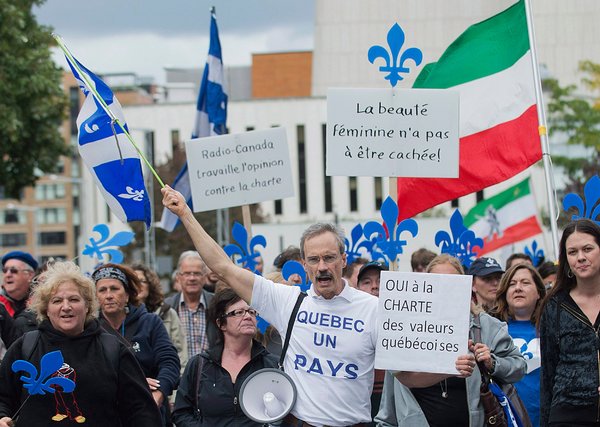By MARTIN PATRIQUIN
MONTREAL — In Quebec, Canada’s second most populous province, the governing Parti Québécois plans to prohibit government employees from wearing “overt and conspicuous” religious symbols while on the job. Everyone from judges to teachers would have to doff their hijabs, kippas, niqabs, turbans and outsize crucifixes. Day care centers would be forbidden to serve kosher or halal foods. Government workers would be allowed to cover their faces only for weather-related — not religious — reasons.
Bernard Drainville, the provincial minister responsible for the ban, part of a so-called Charter of Quebec Values, said it was necessary to “recognize and affirm some of the fundamental values that define us as Quebecers.” But far from unifying the province, the issue has underscored the divisions between the chaotic, multicultural island city of Montreal and the mostly white hinterland beyond its shores.
This may be the unspoken goal of the Parti Québécois, which came in first in provincial elections last year but had to form a minority government. The Parti Québécois’s aim is to remove Quebec from Canada. By targeting Quebec’s religious minorities — in particular, veiled Muslim women, mostly in and around Montreal — the party is rallying its overwhelmingly white Francophone base. The bill has already stirred anti-immigrant resentment: several women’s shelters have reported an uptick in harassment of Muslim women.
The inspiration for the “charter” comes from France, which in 2004 outlawed the wearing of religious symbols in its school system. It is an odd precedent. For one thing, Muslims make up a minuscule proportion of Quebec’s population: about 1.5 percent, compared with roughly 7 percent in France.
And if French classrooms are now hijab-free, it’s because students from observant families have transferred to private religious schools, further cutting them off from the mainstream — undercutting the policy’s aim of assimilation.
The bleak suburbs around France’s cities testify to the dangers of social and economic isolation. Metropolitan Montreal doesn’t have the dangerous banlieues that surround Paris, by any means. But by outlawing religious attire, Quebec’s legislature would present further hurdles to the province’s immigrants, who already suffer from the highest unemployment rates in the country.
As with France’s “headscarf ban,” there are absurd elements in the proposed charter for Quebec. The bronze-and-wood crucifix bolted to the wall of Quebec’s National Assembly, from which Jesus has gazed down on lawmakers for nearly 80 years, would remain. Current government employees who wear religious clothing would have a grace period of up to five years — presumably to change their clothes or their beliefs.
In Quebec, home to North America‘s largest Francophone population, the place of religion remains a stubborn conundrum. Quebecers are proud, militantly so, of their secularism, having rejected the Catholic Church’s control in areas like health and education in the so-called Quiet Revolution a half-century ago.
We are also rightfully protective of the French language. In 1977, the party legislated the language’s primacy in business and government. It also fought (and lost) two referendums, in 1980 and 1995, on independence from Canada.
But while language laws (and Quebec’s French identity) endure, the separatist fever has broken. Year after year, polls show support for independence stuck in the mid-30s. For the Parti Québécois, which rose to power largely because of the previous government’s problems with corruption, it must be torture to be brought in by voters who are largely indifferent to its end game.
Part of the indifference is that English is no longer seen as a tool of the conquering British, but simply the language of commerce. (Today, English Quebecers are overwhelmingly bilingual.)
A vast majority of immigrants to Quebec settle in Montreal, where support for the Parti Québécois is weak. Thanks to immigration laws favoring French-speaking countries, notably those in North Africa, Montreal’s Muslim community has doubled over the last 10 years. It has become a tempting target.
In 2007, the town council of Hérouxville, northeast of Montreal, drafted a “code of conduct” that asked new arrivals to refrain from participating in public stonings, stake-burnings and female circumcision, among other alleged immigrant pastimes.
To his credit, Mr. Drainville, the minister, doesn’t engage in this claptrap. He defends the proposal as a sensible response to a surge in requests for special dispensations — so-called “reasonable accommodations” — for religious minorities. Yet Mr. Drainville has been unable to cite a single case in which such accommodations have hindered the workings of government. Recently, I asked an employee of Quebec’s transport ministry, which has over 5 million yearly interactions with the public, how many requests for reasonable accommodations it receives. The answer: less than five last year.
A recent poll suggested that the values charter was most popular with white, Francophone males living outside Montreal — where immigrants are about as common as New York Rangers fans.
In catering to this white, populist rural vote, the left-of-center Parti Québécois has seemingly ventured into Tea Party territory. Janette Bertrand, the 88-year-old leader of a pro-charter group, recently told a newspaper that she would be “scared” to be served by a veiled doctor, because Muslims let women “die faster.” She wasn’t joking.
Anti-immigrant sentiment exists across Canada. Yet Quebec is the only province with a political party willing to exploit that sentiment for political gain. Will it work? Probably not, if only because winning any future referendum on Quebec’s separation from Canada would mean putting the question to each and every Quebecer — including the very people the Parti Québécois is scaring and scapegoating today.
Martin Patriquin is the Quebec bureau chief for Maclean’s, the news magazine.
Source: http://www.nytimes.com/2013/11/13/opinion/quebecs-tea-party-moment.html?ref=opinion&_r=0








